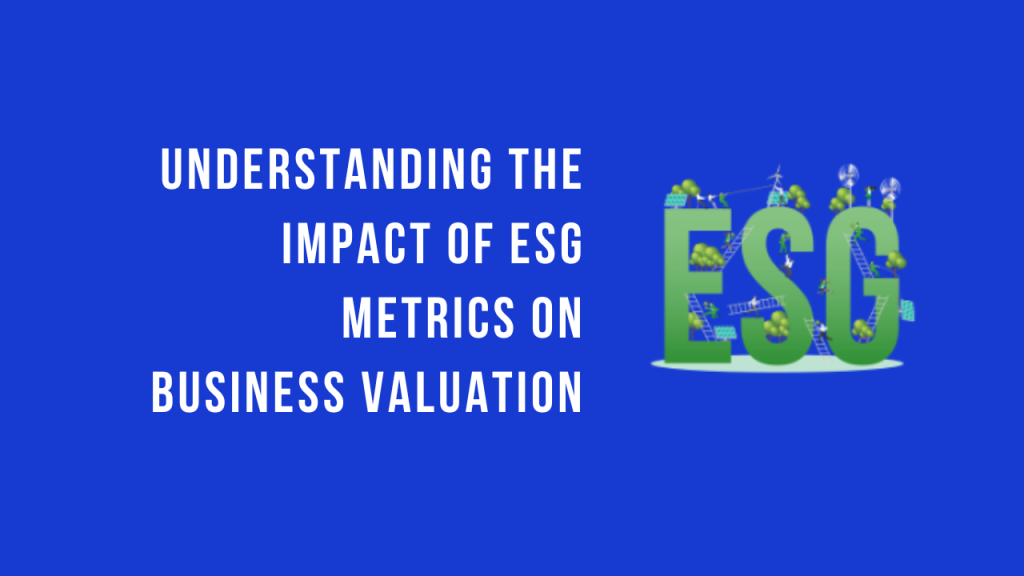Environmental, Social, and Governance (ESG) metrics have become crucial in assessing the value of businesses. With increasing pressure from stakeholders, regulatory bodies, and consumers, ESG metrics now play a central role in determining the sustainability and long-term viability of a company. This article explores the impact of ESG metrics on business valuation, particularly how these metrics influence investment decisions, profitability, and overall corporate reputation.

The Growing Importance of ESG Metrics
Traditionally, business valuation was based on financial performance, revenue growth, and market share. However, the corporate world has shifted its focus to include non-financial factors. ESG metrics provide a broader view of a company’s performance by examining its environmental impact, social responsibility, and governance structure. Investors and stakeholders are no longer just interested in profitability; they also want to ensure that businesses are sustainable and ethical.
Environmental Metrics: Beyond Compliance
Environmental factors assess how a business manages its impact on the planet. Companies with strong environmental policies often attract investors who prioritize sustainability. These factors include a company’s carbon footprint, resource efficiency, waste management, and compliance with environmental regulations.
For businesses, demonstrating environmental responsibility can increase their appeal to eco-conscious consumers and investors. Studies have shown that companies with robust environmental strategies often enjoy long-term cost savings, particularly through reduced energy usage and waste management. Additionally, businesses that integrate environmental metrics into their operational strategies are better equipped to adapt to changing regulations and market conditions, ultimately increasing their business valuation.
Social Metrics: The Human Element of Business
Social metrics focus on a company’s relationships with employees, customers, and the broader community. These include labor practices, employee diversity, customer satisfaction, community engagement, and human rights. A business that excels in social responsibility typically fosters a positive work environment, promotes diversity and inclusion, and maintains strong ties with the communities it serves.
Incorporating social metrics into a business’s valuation is becoming increasingly important. Investors and consumers alike are looking to support companies that prioritize employee well-being and contribute positively to society. Companies that score high on social metrics often enjoy enhanced customer loyalty, improved employee retention, and reduced risks associated with labor disputes or social backlash, all of which contribute to a higher valuation.
Governance Metrics: Ethical Leadership and Accountability
Governance refers to a company’s leadership structure, ethical practices, transparency, and accountability. Strong governance metrics indicate that a company is well-managed, with clear oversight and accountability. This includes board diversity, executive compensation, shareholder rights, and anti-corruption measures.
Governance is closely tied to investor confidence. Companies that practice good governance are perceived as less risky and more stable, increasing their attractiveness to investors. Additionally, businesses with strong governance policies are less likely to encounter legal issues or scandals, which can significantly harm their market value.
How ESG Metrics Affect Business Valuation
- Attracting Investors: ESG-focused investors are becoming more prevalent. Many institutional investors now require companies to meet specific ESG criteria before making investment decisions. Businesses that perform well on ESG metrics often attract more capital, boosting their market valuation.
- Long-term Profitability: While ESG initiatives may require upfront costs, they often lead to long-term financial gains. Companies that reduce their environmental impact, for instance, often experience lower operational costs. Similarly, businesses that treat their employees well see increased productivity and lower turnover rates, positively impacting the bottom line.
- Reputation and Risk Management: ESG metrics also help manage reputational risks. Companies that fail to address environmental, social, or governance issues may face backlash from consumers, investors, or regulatory bodies, negatively affecting their valuation. In contrast, businesses with strong ESG performance are seen as more stable and less prone to regulatory fines, scandals, or public criticism.
- Regulatory Compliance: Governments and regulatory bodies are increasingly mandating ESG disclosures. Companies that stay ahead of regulatory requirements by integrating ESG into their business strategy are better positioned to avoid legal issues, fines, and penalties, which can lower their valuation.
The Future of ESG and Business Valuation
As ESG metrics continue to gain traction, they will play an even larger role in business valuation. Businesses that proactively adopt sustainable and ethical practices are more likely to thrive in the long term, attracting investors and stakeholders who prioritize these values. The shift toward ESG integration is not just a trend—it is becoming a core component of modern business strategies.
Companies that embrace ESG principles are positioning themselves as leaders in their industries, demonstrating resilience, adaptability, and foresight. This not only enhances their market reputation but also contributes significantly to their overall business valuation.
Conclusion
Finout understands the evolving landscape of business valuation and the importance of ESG metrics. As a trusted advisor, Finout is committed to helping businesses integrate sustainable practices into their financial strategies, improving their long-term profitability and market value.
By partnering with Finout, you ensure that your business is prepared to meet the growing demand for ESG transparency and excellence.

